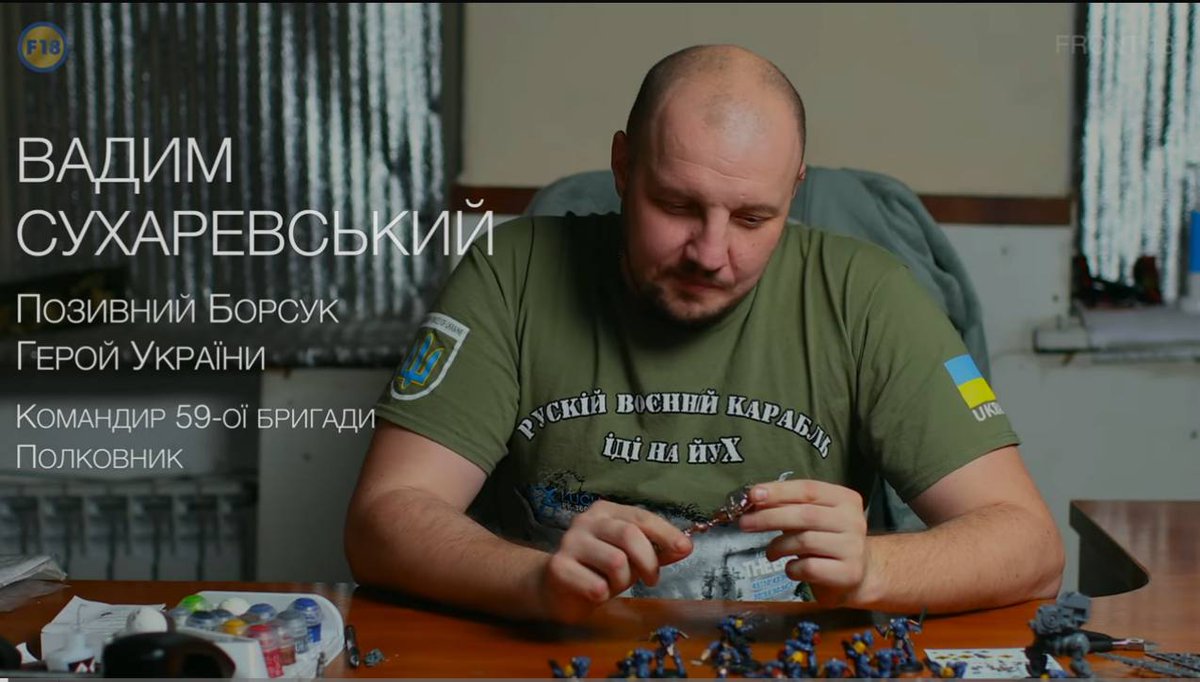1/ Russian soldiers are being provided with Warhammer 40,000-style 'purity seals', blessed by the Russian Orthodox Church, to protect them from harm on the battlefield. The initiative illustrates the huge popularity of Warhammer 40K on both sides of the war in Ukraine. ⬇️ 

2/ Purity seals are an element of Warhammer 40K lore. As the 'Lexicanum' wiki says, they comprise "prayers or litanies inscribed onto paper and then affixed to the Space Marine armour with red or black wax". 

3/ The Russian military equipment maker Ratnik Tactical says on its Telegram channel that "the best warriors of humanity applied scrolls with prayers and promises to their armor before the battle."
4/ "We really liked this image, and we decided that Russian soldiers are rightfully the best warriors of humanity, and can also wear such scrolls into battle. Thousands of seals have already gone to the front, and gave hope to soldiers in the darkest hour."
5/ The seals follow closely the style of those in Warhammer 40K, but have a chrismon (the Chi-Rho symbol) in place of a skull and the words of Psalm 90 inscribed in Cyrillic calligraphy. They are available in normal and 'sooty' versions, priced at 1000-1200 rubles ($10-12) each. 



6/ The seals have been blessed by priests at the Main Cathedral of the Russian Armed Forces in Kubinka near Moscow. Again, this reflects Warhammer 40K lore, which has Space Marine Chaplains blessing purity seals "with chanted litanies in honour of the Primarch and the Emperor." 



7/ The initiative illustrates the huge popularity of Warhammer 40K on both sides of the war in Ukraine, and more widely across Eastern Europe. Purity seals have been used by both sides as far back as February 2023, as seen on the arms of these Russian and Ukrainian soldiers.


8/ Ukrainian commanders are also keen Warhammer 40K fans. The head of Ukraine's drone forces, Vadym Sukharevsky, sits in a gaming chair at his command desk and has a large collection of "Warhammer models, which he glues together in spare evenings", according to The Economist. 

9/ Several Ukrainian units are also named after elements of Warhammer 40K lore. Matching its commander's fandom, one Ukrainian drone unit calls itself the Khorne Group after the Warhammer God of Blood.
https://x.com/Tendar/status/1831330030644756926
10/ The Ukrainians also aren't above a bit of Warhammer cosplay in uniform.
https://x.com/intermarium24/status/1685767197627478017
11/ The Ratnik initiative has been criticised for fusing pagan fantasy with Orthodox theology. Religious journalist and scholar Alexander Soldatov objects to the intermingling of the two. He says:
12/ "Amulets are not typical for the Orthodox tradition at all, they have always been perceived as an element of paganism, magic, in this case, combat magic.
13/ "But in war, all means are good, and the Russian Orthodox Church no longer shies away from using any mechanisms, including purely occult ones."
14/ Soldatov attributes the ROC's slide away from Orthodox tradition to the personal worldview of Patriarch Kirill, the church's leader. He notes that Kirill was strongly influenced by esotericism in the 1960s and 1970s. 

15/ Kirill was friends with Russian faith healer Juna (Eugenia Davitashvili), who claimed to be able to cure cancer, heal broken bones, and prolong life beyond 100 years. He participated with Juna in spiritualistic sessions where she supposedly moved objects with her mind. 

16/ As Soldatov notes, Kirill's decidedly heterodox influences have imprinted on the ROC "a peculiar mix of some Soviet ideas, late Soviet esotericism and individual elements of Christian rhetoric."
17/ "Not even theology, not interpretation of the Holy Scripture, but slogans associated with Russian national patriotic Orthodoxy." /end
Sources:
🔹 wh40k.lexicanum.com/wiki/Purity_se…
🔹 t.me/ioannburdin/19…
🔹 en.wikipedia.org/wiki/Psalm_90
🔹 t.me/ostorozhno_nov…
🔹 t.me/ratnik_tactica…
🔹 t.me/ratnik_tactica…
🔹 economist.com/europe/2024/07…
🔹 poligonmedia.appspot.com/aleksandr-sold…
🔹 wh40k.lexicanum.com/wiki/Purity_se…
🔹 t.me/ioannburdin/19…
🔹 en.wikipedia.org/wiki/Psalm_90
🔹 t.me/ostorozhno_nov…
🔹 t.me/ratnik_tactica…
🔹 t.me/ratnik_tactica…
🔹 economist.com/europe/2024/07…
🔹 poligonmedia.appspot.com/aleksandr-sold…
• • •
Missing some Tweet in this thread? You can try to
force a refresh












